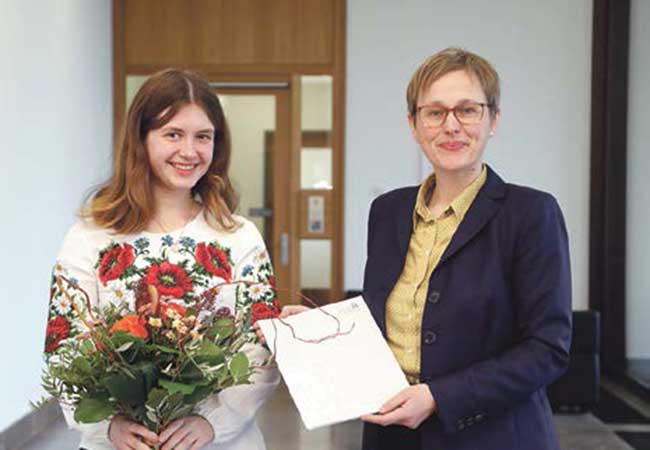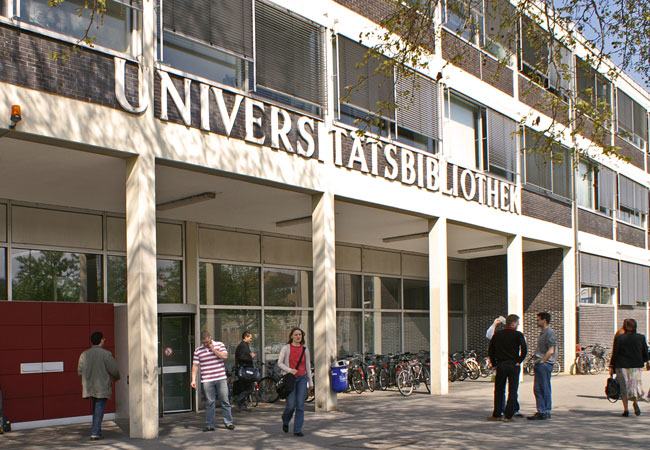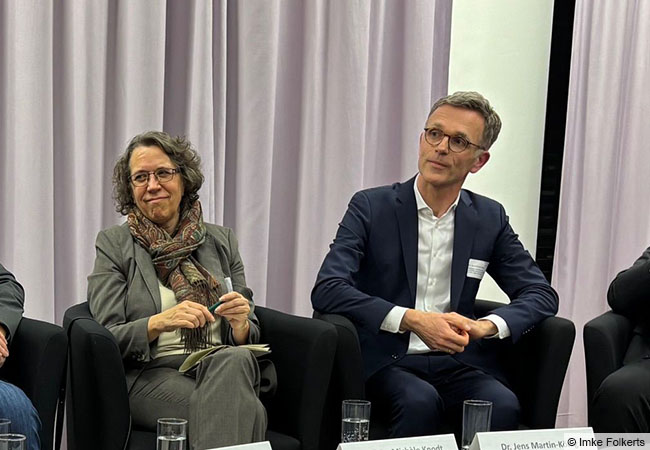Conventional chemotherapy often does not elicit sufficient response in the treatment of bowel cancer. Researchers in Frankfurt recently found that one reason for this is that the dying cancer cells enhance the viability of neighboring tumor cells – an insight they now want to exploit to improve the existing treatment.

Bowel cancer is one of the most common types of cancer worldwide. In Germany, it is the third most common cancer among men, and the second among women. What is more, it is one of the deadliest types of cancer. According to the German Centre for Cancer Registry Data (Zentrum für Krebsregisterdaten), some 24,000 women and men died of bowel cancer 2019. Included in the diagnosis “bowel cancer” are cancers of the colon and the rectum, which is why doctors also speak of colorectal carcinoma. The term “carcinoma” refers to a malignant tumor originating in the epithelium of the skin or, as in the case of colorectal carcinoma, in the mucous membranes.
The chances of successfully treating colorectal carcinoma are still highly dependent on when the disease is discovered. If detected early, an operation to remove the tumor often results in a complete cure. However, if the cancer has already spread to adjacent lymph nodes, an operation alone will not suffice. Most patients subsequently also receive chemotherapy. Even though effective drugs exist for this purpose, it is often no longer possible to prevent the disease from advancing completely: At this later stage, the mortality rate remains high. One reason for this, known for a long time, is that due to a mutation in their genetic material, individual bowel cancer cells can become resistant to the chemotherapeutics administered. Researchers at the Georg Speyer Haus – Institute for Tumor Biology and Experimental Therapy and Goethe University Frankfurt have now discovered an entirely new mechanism that helps tumors in the bowel survive chemotherapy and subsequently continue growing. Their results, published in the prestigious journal “Nature”, will now assist in improving treatment for cancer patients.
Not all the cells die
The goal of chemotherapy is to kill tumor cells, and the classical treatment for colorectal cancer is the antimetabolite 5-fluorouracil (5-FU) – a molecule that structurally resembles one of the building blocks of DNA. Thanks to this resemblance, the cell machinery uses it just like the natural component, even though it does not function like the original. It is precisely this loss of function that ultimately prevents the synthesis of new DNA. Whereas rapidly growing cells – like cancer cells in particular, but also immune cells – are susceptible to chemotherapeutics such as 5-FU, most of the body’s healthy cells are less affected.
In practice, however, it has repeatedly been found that not all colorectal cancer cells die during treatment with 5-FU. After the course of treatment, these cells continue to multiply, which means the tumor resumes its growth. Until the recent publication by the research team surrounding Georg Speyer Haus Director Florian Greten and his co-worker (and first author) Mark Schmitt, the mechanism behind this, when there is no genetically acquired resistance, was not really understood. “An early experiment gave us a clue that the dying bowel cancer cells might be responsible,” says Greten, who is also Professor of Tumor Biology at Goethe University and spokesman of the Hessian LOEWE Center Frankfurt Cancer Institute [known by its German acronym, LOEWE stands for Hesse’s state offensive for the development of scientific and economic excellence]. “We used a tumor model for this experiment, and deliberately killed off one group of cells – the stem cells – from which the tumor would normally regenerate itself. However, contrary to our expectations, the tumor carried on growing without the stem cells, and we found that a certain new signaling pathway had been activated in the surviving cancer cells. We decided to pursue this and find out whether something similar was also happening during chemotherapy.”
Reprogramming for growth
To test this hypothesis, the scientists in Frankfurt used structures resembling organs, which they created in the laboratory from human colorectal cancer cells. When these organoids were treated with the standard therapeutic drug, 5-FU, most of the cancer cells died as expected – but some of them survived. In these cells, the very same signaling pathway Greten and his team had discovered in their earlier experiment was switched on. The regulation of this mTOR signaling pathway is complex and can trigger a large number of reactions inside the cell, but it is always associated with growth processes. So, it is not surprising that an overactive mTOR signaling pathway – the cause of a faulty regulation – is one of the factors known to promote carcinogenesis. That is also why substances that inhibit the pathway are already deployed in the treatment of cancer.
One such TOR inhibitor is rapamycin. The Frankfurt team exploited its effects to confirm that the activated mTOR-signaling pathway really did promote the growth of surviving colorectal cancer cells. “When we administered rapamycin and 5-FU simultaneously to the organoids, the tumor cells that had survived treatment with 5-FU no longer grew – the tumor died off,” the oncologist explains. They observed the same effect in laboratory animals: tumors placed under the skin of mice exhibited greater shrinkage after simultaneous treatment with 5-FU and rapamycin.
Signal in the cytosol
The question remained: How could the scientists be sure that the dying cells, and not the administration of 5-FU, were activating the mTOR pathways? To answer this, they applied a genetic tool that had already provided initial indications of the dying cells’ significance. “We created colorectal cancer organoids in which we were able to specifically kill off the stem cells,” Greten recounts. “The reason for this is that the stem cells carry an artificially introduced gene cassette that reacts to a bacterial toxin. When we administer this toxin to the organoids, it is only the stem cells that are present that die – which is roughly one third of all cells.” As hoped, the surviving 70 percent exhibited an activation of the mTOR signaling pathway, even though 5-FU had not been administered. As in the previous experiments, rapamycin also prevented tumor growth.
The next question was which signal the dying cells were using to reprogram their surviving neighbors. If a cell is killed by a chemotherapeutic drug, for example, its cell membrane bursts and the cytosol is released into the intercellular spaces. Some substances it contains are known to stimulate the immune system to eliminate cell debris and initiate repair mechanisms. Other substances, by contrast, could activate the mTOR signaling pathway. “To investigate this, we prepared a filtrate from organoids in which we had killed off some of the cells,” Greten explains. “The filtrate therefore contained all the components the dying cells had released. Administering the filtrate to untreated organoids activated the mTOR signaling pathway in all the cells.”
Dependency brings vulnerability
The research team first excluded several of the cell contents’ components, and then concentrated on the universal energy storage molecule adenosine triphosphate (ATP), large quantities of which are, on the one hand, released by the treated organoids, and which – on the other hand – can stimulate receptors (purinoceptors) on the surface of colorectal cancer cells, either on its own or as a by-product. When the scientists applied ATP directly to their organoids, this switched the mTOR pathway on. This did not happen, however, if they inhibited the purinoceptors. “We were able to show that ATP binds very specifically to the P2X4 receptor that is strictly regulated in epithelial cells,” Greten says. “This then activates the mTOR signaling pathway in a manner that we don’t yet fully understand.”
It remains unclear how the mTOR pathway enables the cells to survive. But Greten is certain that it is no specific resistance mechanism. Instead, the oncologist believes the mTOR pathway is more of a general survival factor that turns all the switches inside the cell to growth. “The fact that dying tumor cells communicate with their neighbors and give them instructions for survival, so to speak, is a completely new finding with the potential to greatly improve the treatment of bowel cancer,” he says, clearly pleased by the prospect. “Since the surviving cells depend on their active mTOR signaling pathway, if we inhibit the signaling pathway, they die.”
Clinical study in preparation
But why is that? The signaling pathway is obviously not necessary for the cancer cells to survive before they come into contact with dying cells. The researchers found the answer in the cytosol from cells that had burst. “Alongside ATP and many other metabolic products, reactive oxygen compounds are also released, which can damage cellular structures like DNA,” Greten points out. “We were able to show that a cell-specific program is activated in cells coming into contact with these reactive compounds, which programs cell death.” This process, known as apoptosis, serves to bring about the orderly destruction of damaged cells and prevent damaged cells from harming the organism due to malfunctions. As for the mTOR pathway: It is a powerful apoptosis blocker – if activated simultaneously, it can avert cell death and initiate growth processes instead.
This is where medicine comes into play, as Greten explains: “If we can inhibit the mTOR pathway in patients, the pro-apoptotic program will maintain the upper hand and the tumor will die off.” Rapamycin, already approved as treatment for other indications, could be used for that. However, Greten still has some concerns: “Rapamycin has a narrow therapeutic spectrum, meaning many side-effects are to be expected, since the mTOR pathway is so central and influences so many functions inside the cells.” One alternative, he says, could be specific inhibitors of P2X4 receptors, which would prevent the mTOR pathway from being activated by ATP binding to the receptors. “Right now we are planning a clinical study together with a pharmaceutical company that has developed such an inhibitor,” he adds. If the study is successful, it would only take a little extra work to adapt an established treatment to make it much more effective against bowel cancer.
Larissa Tetsch












